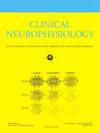Movement-related cortical potentials underlying motor preparation and execution in children with attention-deficit/hyperactivity disorder
IF 3.7
3区 医学
Q1 CLINICAL NEUROLOGY
引用次数: 0
Abstract
Objective
Motor control difficulties are highly common in Attention-Deficit/Hyperactivity Disorder (ADHD), yet the etiology of this comorbidity remains unclear. We examined (1) whether children with ADHD have atypical movement-related cortical potentials (MRCPs) during movement preparation and/or execution compared to typically developing (TD) children, and (2) whether MRCPs associated with visual-motor performance and ADHD symptoms overlap.
Methods
MRCPs and visual-motor integration (VMI) were measured among 66 right-handed children with ADHD and 30 TD children (ages 7–11 years). Caregivers reported on ADHD symptoms. MRCPs were extracted over fronto-central scalp regions during two ERP tasks requiring button presses.
Results
Children with ADHD had lower accuracy on MRCP tasks and reduced VMI scores, compared to TDs. ADHD diagnosis was associated with attenuated correct trial MRCP amplitudes at a fronto-midline electrode during movement preparation, but not execution. ADHD symptom severity and reduced error trial MRCP amplitudes each explained unique variance in VMI performance.
Conclusions
Pediatric ADHD is associated with atypical cortical activity during movement preparation, but not execution. VMI performance and ADHD diagnosis were associated with distinct motor cortical processes, providing support for the separate etiology hypothesis.
Significance
Motor difficulties in children with ADHD may require an intervention approach that is distinct from the treatment of core ADHD symptoms.
注意缺陷/多动障碍儿童运动准备和执行的运动相关皮层电位
运动控制困难在注意缺陷/多动障碍(ADHD)中非常常见,但这种合并症的病因尚不清楚。我们研究了(1)与正常发育(TD)儿童相比,ADHD儿童在运动准备和/或执行过程中是否具有非典型运动相关皮质电位(MRCPs),以及(2)MRCPs与视觉运动表现和ADHD症状是否重叠。方法对66例右撇子ADHD儿童和30例7 ~ 11岁右撇子TD儿童的smrcp和VMI进行测量。护理人员报告了ADHD症状。在两个需要按下按钮的ERP任务中提取头皮额中央区域的mrcp。结果ADHD儿童在MRCP任务上的准确性较低,VMI评分较低。ADHD诊断与运动准备期间额中线电极的正确试验MRCP振幅减弱有关,但与运动执行无关。ADHD症状严重程度和减少错误试验MRCP振幅各自解释了VMI表现的独特差异。结论小儿多动症与运动准备过程中的非典型皮质活动有关,而与运动执行过程无关。VMI表现和ADHD诊断与不同的运动皮质过程相关,为单独的病因假说提供支持。ADHD儿童的运动困难可能需要一种不同于核心ADHD症状治疗的干预方法。
本文章由计算机程序翻译,如有差异,请以英文原文为准。
求助全文
约1分钟内获得全文
求助全文
来源期刊

Clinical Neurophysiology
医学-临床神经学
CiteScore
8.70
自引率
6.40%
发文量
932
审稿时长
59 days
期刊介绍:
As of January 1999, The journal Electroencephalography and Clinical Neurophysiology, and its two sections Electromyography and Motor Control and Evoked Potentials have amalgamated to become this journal - Clinical Neurophysiology.
Clinical Neurophysiology is the official journal of the International Federation of Clinical Neurophysiology, the Brazilian Society of Clinical Neurophysiology, the Czech Society of Clinical Neurophysiology, the Italian Clinical Neurophysiology Society and the International Society of Intraoperative Neurophysiology.The journal is dedicated to fostering research and disseminating information on all aspects of both normal and abnormal functioning of the nervous system. The key aim of the publication is to disseminate scholarly reports on the pathophysiology underlying diseases of the central and peripheral nervous system of human patients. Clinical trials that use neurophysiological measures to document change are encouraged, as are manuscripts reporting data on integrated neuroimaging of central nervous function including, but not limited to, functional MRI, MEG, EEG, PET and other neuroimaging modalities.
 求助内容:
求助内容: 应助结果提醒方式:
应助结果提醒方式:


